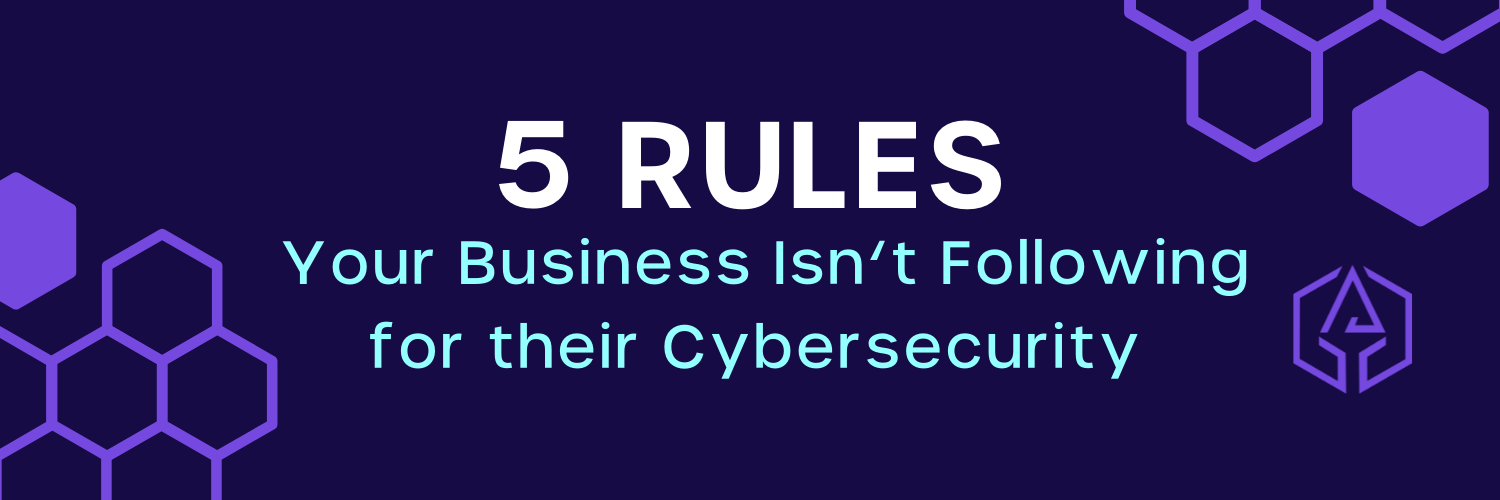5 Cybersecurity Rules Your Business Isn’t Following (& How to Fix Them)

5 Cybersecurity Rules Your Business Isn’t Following (& How to Fix Them)
Cyvatar | 10/21/2021With a whopping 60% of small businesses running without cybersecurity policies (according to a survey by the Cyber Readiness Institute), it’s no surprise that many businesses are leaving themselves unnecessarily vulnerable to cyberattacks.
Hacks happen — and will continue to — but your business can make small changes that make a big impact when it comes to cybersecurity.
Here are the 5 cybersecurity rules your business isn’t following (and how to fix them):
- Your team isn’t educated on cybersecurity.
- You’re not requiring strong passwords.
- You’re not protecting your data.
- You’re not using strong networks.
- You’re not using strong systems.
#1 rule you aren’t following: Your team isn’t educated on cybersecurity.
According to the Herjavec Group, it was estimated that by 2021 a business will fall victim to a ransomware attack every 11 seconds.
A major cause of cybersecurity breaches within organizations? Internal access.
Whether an employee or team member clicked a malicious link, downloaded a file, or didn’t use a secure enough password, your internal team can either be your greatest defense or your biggest vulnerability.
How to fix it: Use your employees as your first line of defense.
Simple and purposeful education will ensure your employees do a better job protecting data (and bank information), avoiding unknown links, creating stronger passwords, and more.
By rethinking cybersecurity, you’ll start to see how educating your employees on best practices will actually strengthen your security.
#2 rule you aren’t following: You’re not requiring strong passwords.
Do you remember the last time you were able to log into an application without at least one uppercase and one lowercase letter, one number, and one special character?
There’s a good reason for that: passwords like “changemenow” or “test123” haven’t cut it for a long time. Cybercriminals can either guess or use sophisticated hacking to easily access your systems by way of your users’ logins.
What’s worse is hackers use lateral movement to move quickly through systems, gaining access to more and more of your data before you even have a clue.
How to fix it: Require strong passwords, multi-factor authentication, and privileged access.
Start by using assets and systems that require strong passwords and multi-factor authentication.
Then take things a step further: implement privileged access to ensure certain applications are only on a need-to-know basis.
#3 rule you aren’t following: You’re not protecting your data.
Whether you’re a small business that feels you’ve never needed to password protect your assets or you’re giving third-party companies too much access, you’re leaving yourself vulnerable to attack.
File sharing and even texting about internal business matters can leave you susceptible. In fact, hackers can easily create email addresses or phone numbers that look like a team member or subcontractor.
What’s more is that hiring third-party employees, contractors, or agencies opens your data up to an entirely new vulnerability. Allowing too much access gives cybercriminals even more points of entry.
How to fix it: Restrict third-party access and manage cloud SaaS data.
At a minimum, your assets should all be protected with the password steps from above.
Third-party access should be as restricted as possible to only need-to-know files and applications, with the ability to monitor all activity and remove access once work or the contract is complete.
Additionally, managing your cloud SaaS data more proactively means gaining better visibility and ongoing observation of all of your applications.
#4 rule you aren’t following: You’re not using strong networks.
Not all networks are created equal. If your wifi network isn’t secure, encrypted, and hidden, it can potentially be accessed by anyone.
Plus, with more at-home employees than ever before, home and mobile networks also need to be secure.
How to fix it: Implement secure networks and firewalls.
You can do your due diligence in the office by implementing more secure wifi parameters, but what about employees who are working at home?
A VPN (virtual private network) is a great solution for reducing vulnerabilities. Incorporate this into your internal cybersecurity policies and ensure each and every employee has one enabled.
Additionally, firewall protection can be used both at work and at home. This defensive measure can help stop hackers from accessing unauthorized content and assets.
#5 rule you aren’t following: You’re not using strong systems.
Your cybersecurity systems are only as good as their latest update; otherwise, you’re creating vulnerabilities in your own system. Each update means additional malware or virus protection for your business.
Additionally, regular backups of your data and systems mean that you won’t lose valuable time and money should they be hacked or stolen.
How to fix it: Make updates and manage incident response.
If it’s been some time since you’ve installed the latest updates to your cybersecurity systems, then it’s time to make that a priority. Staying up-to-date on your software is an easy way to stay more secure, so remind staff and employees to update their personal software as it becomes available too.
Create and follow protocols for backing up files and data, including how often and where backups should be made. As many attacks are focused directly on data, this will help keep your sensitive information available if there’s a hack.
What’s more is you may not have a plan in place, should you be hacked or your data be compromised. Incident response management accounts for multiple security breach scenarios and a variety of real world exercises that help your team prepare in case of emergency.
You may not be actively managing your cybersecurity in one or all of these five ways. It’s time to change that with proactive measures.
Ready to get started with effortless cybersecurity?
Try our intuitive Cyvatar Platform. The best part? It’s free to get started.
